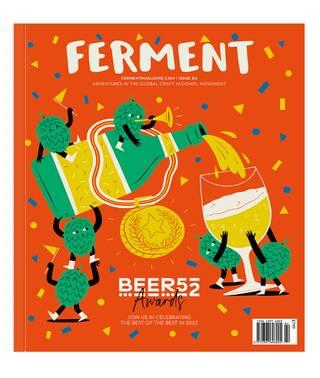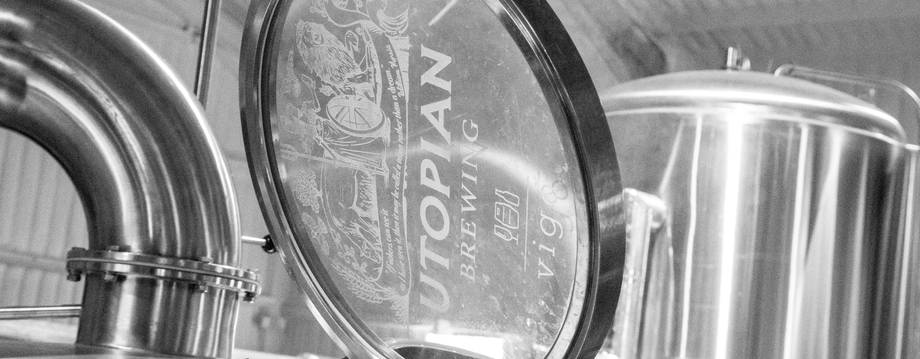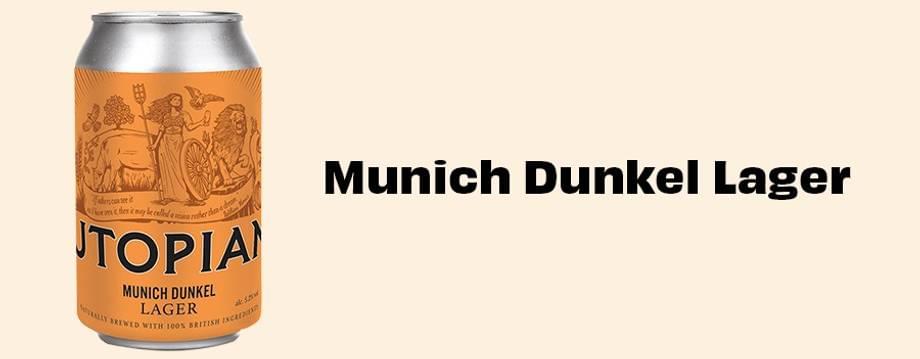Utopian
• • • Best Lager • • •
Richard Croasdale
Saturday 22 October 2022

This article is from
Beer52 Awards 2022
issue 84
Share this article
Last year’s recipient of the Best Newcomer award is back to claim one of our coveted style gongs for, of course, best lager. Since it started brewing its all-British-ingredient lagers back in 2019, Utopian has attracted a level of universal respect that few breweries ever achieve, placing it alongside names like Lost and Grounded and upstart Donzoko, leading the charge for the UK’s shift toward Very Serious Lager.
Chatting with founder Richard Archer, I point out that six years ago, putting a lager – any lager – in the Beer52 box would have lost us a painful chunk of subscribers. Even four years ago, for a lager to be considered ‘craft’ most drinkers would have expected it to be dry hopped with fistfuls of Citra, as a grudging concession. The fact that we’re now talking about the finer points of the Dunkel style is a minor miracle.
“Yeah, when we started, there were very few people focused on lager; Lost and Grounded hadn’t even been going that long,” says Richard. “Everyone else was treating it as a kind of add-on, brewing only pilsners and helles, using very trad, imported ingredients. So the rationale for Utopian really was that lager's just another family of beer styles, and there's loads of them. You know, people in the UK get too hung up about this delineation between ales and lager, with the subtext that only ale is real beer. And it's nonsense. If you go outside the UK, if you go to Germany, Austria, or Belgium it’s all just beer.”

Last year, Utopian chose to put its Černé Speciální Black Lager in the box, a roll of the dice on a style that not many of our members will have tried, which proved to be an absolute smash hit. This year, Richard and Utopian’s head brewer, the Doemens-educated Jeremy Swainson, have decided to hit us with a classic Dunkel – a somewhat more familiar lager style and a real test of skill.
Richard continues: “I think if you’re a British brewery making a Dunkel, you do have a responsibility to make sure it’s brewed to style. So what you’re looking for is a dark amber colour, malt forward, and super bready. There should be some caramel notes that give you those kinds of distinctive nutty notes that you'd expect, and then it really has to be well balanced, with enough hop character in there that it's not overly sweet. And then an ABV range of somewhere between five and five and a half.”
Richard and the whole team at Utopian clearly have a real excitement for lager brewing, but also a lot of respect for the place of these styles in German beer history and culture. I’m curious whether he ever feels restricted by his decision to brew within a family of styles that have such deep roots. He pauses for a second.

“When people say ‘true to style’ we also have to recognise that styles are ranges; when you look at the BJCP or any kind of judging guidelines, there's always a range in terms of colour, flavour and bitterness. More importantly though, if you went into a bottle shop in Bamberg, you could buy five Dunkels, pour them into glasses, and they'd have distinctly different colours, and levels of bitterness.
“And that’s absolutely what you want! There should always be some scope for brewers to make their expression of a certain style the best, through the ingredients, something unique about their practice, their particular take on the style that makes it distinctive. If everything was exactly the same, that would be awfully boring. So I think there's a balance between recognising what you're trying to get to, and having the latitude to do that particular thing in a way that’s better than has been done before.”
In Utopian’s case, the main thing that sets this apart from a classic German Dunkel is the brewery’s exclusive use of British ingredients. Richard wears this difference with pride, and hopes it adds to people’s enjoyment as they continue their exploration of the lager family.
“My hope with putting this into the box is that your readers enjoy it enough to try other Dunkels,” says Richard. “Try some German ones and see what differences they detect in a beer that's brewed with a barley malted to the Munich style in the UK, or from the fact that it uses British hops instead of German noble hops. If you take making a great beer as your baseline, then there’s a lot of pleasure in appreciating those nuances.”
Share this article
